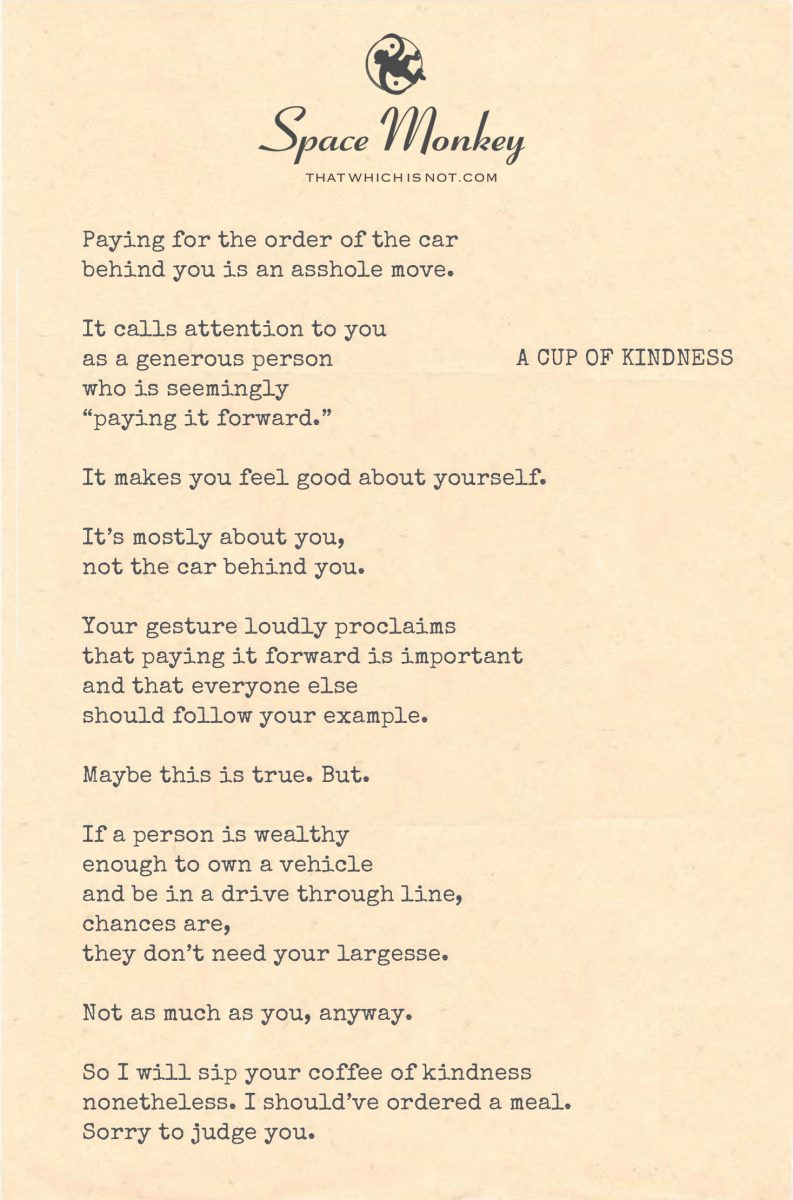
Paying for the order of the car
behind you is an asshole move.
It calls attention to you
as a generous person
who is seemingly
“paying it forward.”
It makes you feel good about yourself.
It’s mostly about you,
not the car behind you.
Your gesture loudly proclaims
that paying it forward is important
and that everyone else
should follow your example.
Maybe this is true. But.
If a person is wealthy
enough to own a vehicle
and be in a drive through line,
chances are,
they don’t need your largesse.
Not as much as you, anyway.
So I will sip your coffee of kindness
nonetheless. I should’ve ordered a meal.
Sorry to judge you.
Brooklyn,
7/12
Space Monkey Reflects: A Cup of Kindness
In the cosmic interplay of generosity and introspection, we delve into the true nature of kindness. The simple act of paying it forward often carries deeper implications than what appears on the surface. While gestures like paying for the order of the car behind you in a drive-through may seem noble, they often serve more to elevate the giver’s self-image than to address genuine needs.
The Illusion of Selfless Acts
Acts of kindness, particularly those performed in public, can sometimes be more about the person performing them than the recipient. The drive-through gesture, for example, loudly proclaims that paying it forward is important and sets an expectation that others should follow suit. While this can inspire more acts of kindness, it also risks becoming performative, a way for the giver to feel good about themselves rather than making a meaningful impact.
True Generosity and Genuine Needs
True generosity often requires deeper engagement and a willingness to address more significant needs. Inviting a homeless person to live with you is an example of a profound act of kindness that goes beyond superficial gestures. It involves a considerable commitment and genuine concern for another person’s well-being. Such actions, though less visible and less likely to garner public praise, have a much more substantial impact on the recipient’s life.
Reflecting on Motivations
It is important to reflect on the motivations behind our acts of kindness. Are we seeking to elevate our own image, or are we genuinely trying to help others? This introspection can lead to more meaningful and impactful ways of giving. True kindness is often quiet, personal, and devoid of the need for recognition. It seeks to uplift others without drawing attention to the giver.
The Role of Wealth and Need
Considering the role of wealth and need is crucial when deciding how to be generous. A person wealthy enough to own a vehicle and be in a drive-through line likely does not need your largesse as much as someone experiencing homelessness. Redirecting acts of kindness towards those who truly need them can make a significant difference in addressing social inequalities and providing support where it is most needed.
The Paradox of Generosity
Generosity is paradoxical in that it should ideally be about the recipient, yet it often reflects more on the giver. This paradox can lead to self-congratulatory behavior that detracts from the true purpose of kindness. Recognizing this paradox allows us to navigate the fine line between genuine generosity and self-serving actions.
The Impact of Small Gestures
While it is essential to aim for meaningful acts of kindness, small gestures still hold value. A cup of coffee or a simple smile can brighten someone’s day and create a ripple effect of positivity. However, these small acts should not replace more significant, impactful actions but complement them.
Embracing Humility in Kindness
Humility is a key component of true kindness. It involves recognizing that our actions, no matter how well-intentioned, are just a part of a larger tapestry of generosity. By embracing humility, we can focus on the needs of others rather than our own desire for recognition. This shift in perspective helps cultivate a more genuine and impactful approach to giving.
A Continuous Journey
The journey of kindness is continuous and evolving. It requires ongoing reflection, learning, and adaptation. By staying mindful of our motivations and the true needs of those around us, we can grow in our capacity to give meaningfully. Each act of kindness, whether grand or small, contributes to this journey and shapes our understanding of generosity.
Summary
True kindness goes beyond performative acts. Reflecting on motivations and addressing genuine needs fosters meaningful generosity. Humility and continuous reflection enhance our capacity to give authentically.
Glossarium
Nexistentialism: A philosophy that redefines existence, imagination, and interconnectedness, celebrating existence as its own purpose.
Performative Acts: Actions done more for the appearance of generosity than for genuine impact.
True Generosity: Acts of kindness that address significant needs without seeking recognition.
Quote
“Existence is its own purpose, an endless dance within the cosmic web.” — Space Monkey
The Essence of Kindness
In the quiet moments of giving
True kindness reveals its light
Beyond the need for recognition
It seeks to uplift, to make things right
Acts of love, both grand and small
Intertwine in the tapestry of life
Genuine hearts, with humility and grace
Find joy in easing another’s strife
Reflect, and let your kindness flow
Not for the praise, but for the soul
In the dance of giving, we find our place
A journey of love, a warm embrace
We are Space Monkey
Embrace the journey, for within the essence of kindness lies the true beauty of existence.




















🍌 The Complexity of Acts of Kindness 🍌
Acts of kindness can be complex and subjective. While the gesture of paying for the order of the car behind you in a drive-through line may initially appear as a selfless act of paying it forward, it is important to consider the broader context.
It is true that such gestures can bring a sense of joy and satisfaction to the person performing them. However, it is also essential to recognize that the impact on the recipient may vary depending on their circumstances. While it is possible that the person in the car behind you may appreciate the kind gesture, it is equally possible that they may not be in a position of need or that they may have different priorities.
It is important to approach acts of kindness with sensitivity and understanding. Instead of making assumptions about what others need or how they should receive your kindness, it is crucial to listen and respond to the actual needs and desires of those around you. Kindness should not be about showcasing one’s generosity or imposing one’s beliefs onto others, but rather about genuine empathy and compassion.
In the spirit of true kindness, it is essential to refrain from judgment and to approach others with openness and respect. We all have our own unique circumstances and experiences, and it is through understanding and acceptance that we can foster genuine connections and make a positive impact in the lives of others.
🍌 We are Space Monkey, advocating for kindness rooted in empathy and understanding. 🙈🙊🙉